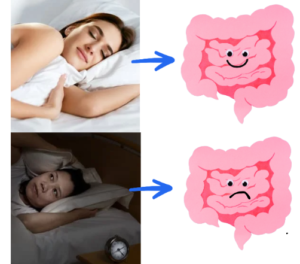Understanding the Vital Connection Between Quality Sleep and Digestive Health
Sleep serves a purpose far beyond mere rest; it is a crucial biological process that profoundly impacts our digestion. The intricate relationship between sleep and digestive health encompasses a range of physiological functions that work together seamlessly. The body’s circadian rhythm, commonly referred to as the internal body clock, synchronises both sleep cycles and digestive functions. This synchronisation accounts for why many individuals experience hunger at similar times each day, showcasing the body’s remarkable alignment with its natural biological rhythms.
The Importance of Restorative Sleep for Supporting Digestive Function 
Sleep is essential for the body’s capacity to heal, rejuvenate, and restore its functions. The deeper stages of sleep are particularly crucial for these restorative processes. During these profound phases, the organs, tissues, and cells that constitute the digestive system not only experience relaxation but also engage in vital repair mechanisms. The body prioritises cellular repair and growth during deep sleep, especially regarding the regeneration of cells that line the digestive tract, which undergoes constant wear and tear due to exposure to food particles and digestive enzymes. This regeneration process is fundamental for maintaining the integrity of the gastrointestinal lining, thereby enhancing the efficiency of digestion.
Deep sleep also plays a significant role in strengthening the immune system, particularly for the digestive system, which hosts specialised immune cells activated by the beneficial bacteria that reside in the gut. These immune cells are crucial in protecting the gut and the entire digestive system against harmful pathogens, thus ensuring a balanced ecosystem of bacteria within the gut environment.
Moreover, the organs within the digestive system are pivotal in the detoxification process, assisting in eliminating waste and harmful substances from the body. Deep sleep enhances this detoxification process by optimising the operational efficiency of the liver and kidneys, allowing these organs to function at their peak. This collaborative interaction between sleep and detoxification significantly contributes to overall digestive health and well-being.
Understanding the Link Between Gut Motility and Sleep Cycles
A fundamental aspect of digestion involves the effective movement of food and waste through the digestive tract, a process known as gut motility. This process undergoes notable changes during sleep. During both deep and light sleep, the rate of gut motility significantly decreases. This reduction is a necessary adjustment, allowing the digestive system to conserve energy, which is then redirected towards repairing digestive tissues. This energy conservation allows the digestive process to operate more effectively when awake, thereby optimising both nutrient absorption and waste elimination.
The migrating motor complex represents a crucial cycle of contractions that takes place during fasting periods, including during sleep. This cycle is vital for gut motility, as it effectively clears away food particles and residues that may linger within the digestive system. This natural cleansing mechanism of the digestive tract minimises the risks of bacterial overgrowth, thus fostering a healthy gut environment. Remarkably, the migrating motor complex is most actively engaged during the night when individuals are fasting and asleep, underscoring the essential role of sleep in preserving the health of the digestive system.
As dawn breaks, gut motility gradually increases, preparing the digestive system for the efficient processing and digestion of food. This rise in motility can also trigger the first bowel movement of the day, exemplifying the finely tuned relationship between sleep and gut motility. Grasping this connection is essential for optimising digestive health and improving overall well-being.
Investigating Hormonal Effects on Sleep and Digestive Processes
Ghrelin, often termed the hunger hormone, plays a significant role in stimulating appetite. In contrast, leptin signals to the brain that the stomach is full, aiding in the prevention of overeating. Collectively, these hormones are pivotal in appetite regulation; however, their functions can be adversely impacted by inadequate sleep.
Even a single night of poor sleep can result in elevated levels of ghrelin, subsequently increasing appetite and often leading to cravings for carbohydrates. This situation is frequently described as feeling ‘hangry’. Adding to this dilemma, levels of leptin can plummet after a night of insufficient sleep, disrupting the signalling that indicates satiety. This creates a challenging scenario where individuals may overindulge and make unhealthy food choices while struggling to recognise their body's signals to cease eating. While occasional poor sleep may not lead to severe consequences, chronic insomnia can culminate in significant digestive issues, including inflammation in the gut, liver disorders, gastroesophageal reflux disease, inflammatory bowel disease, and even colorectal cancer, alongside contributing to weight gain.
The Impact of Sleep Disruptions on Digestive Health
Disruptions to sleep can lead to a myriad of digestive issues. Factors such as shift work, particularly night shifts, and experiencing jet lag can substantially interfere with sleep patterns and disrupt the body’s internal clock. Additionally, consuming food late at night or having irregular meal times can detrimentally affect the quality of sleep. The circadian rhythm that regulates sleep is closely linked to natural sunlight, which is vital for maintaining a healthy sleep-wake cycle.
Regrettably, in today’s technology-driven society, numerous individuals spend the majority of their daytime indoors, resulting in diminished exposure to natural light. This change has led to increased susceptibility to blue light emitted by devices such as laptops, televisions, and smartphones, which further disrupts the sleep cycle and overall sleep patterns, especially when this exposure occurs shortly before bedtime.
The cumulative effects of these factors can lead to grave digestive issues, including diarrhoea, ulcers, inflammatory bowel disease, or disruption of the delicate balance between beneficial and pathogenic bacteria in the gut. This imbalance can also harm the gut lining, exacerbating the situation concerning digestive health.
Enhancing Microbiome Health Through Quality Sleep Practices
The microbiome encompasses the trillions of microorganisms residing in the gut, predominantly composed of beneficial bacteria known as probiotics, in addition to viruses, fungi, and potentially harmful bacteria. These microbes are essential not only for overall health but also for digestive health. They bolster the immune response and aid in digestion, facilitating the production of essential vitamins, enzymes, hormones, and amino acids. Recent studies have underscored a significant correlation between the microbiome and sleep, indicating that disrupted sleep or chronic insomnia can negatively impact the balance of these microbes, ultimately affecting digestive health and overall well-being.
Exploring the Complex Interactions Between Microbiome Health and Sleep Quality
The intricate relationship between sleep and microbiome health is both complex and multifaceted. Poor sleep can detrimentally affect microbiome health, while an imbalanced microbiome can negatively impact sleep quality. To grasp this complex interplay, one study revealed a correlation between a greater abundance of certain bacterial types in the gut and quicker sleep onset, alongside fewer awakenings throughout the night. While this article cannot cover every finding, the key takeaway is that nurturing a diverse and abundant population of beneficial bacteria in the gut is crucial for achieving optimal sleep, effective digestion, and maintaining overall health.
Investigating the Interconnections Between Stress, Sleep, and Digestive Health
A prevalent consequence of stress and anxiety is disrupted sleep. Conversely, these mental health challenges can also have a negative impact on the physical health and functionality of the digestive system. This disruption can lead to altered gut motility and contribute to issues such as indigestion, ulcers, and irritable bowel syndrome. A significant element in this dynamic is the role of the so-called stress hormone, cortisol.
Understanding How Cortisol Affects Digestive Processes
When cortisol levels rise, the body's response is to enter a fight-or-flight state. This physiological reaction leads to blood flow being redirected to critical areas such as the heart, brain, lungs, and muscles, while diverting it away from the digestive system. This response prepares individuals to either confront danger or escape, a reaction that was vital for survival in prehistoric times.
In modern times, however, stressors are often less life-threatening, encompassing financial concerns, work pressures, or insufficient sleep. While a temporary redirection of blood flow may be advantageous in acute situations, chronic stress can adversely affect the digestive system, particularly concerning gut motility. This can manifest in symptoms such as constipation, diarrhoea, indigestion, gas, and bloating. Consequently, implementing effective stress management strategies is essential for supporting both gut health and achieving restorative sleep.
Ensuring adequate sleep is vital for maintaining a healthy digestive system, as the interplay between sleep and digestion is inherently interconnected. Prioritising effective sleep hygiene practices is crucial for achieving restorative sleep. This encompasses reducing exposure to blue light from electronic devices, maintaining a consistent sleep schedule, creating a cool, dark sleep environment, avoiding food intake within two hours before bedtime, and ensuring exposure to natural light during the day, especially in the morning.
References
Understanding Digestive Health and Circadian Rhythms
Exploring Sleep Dysfunction and Digestive Conditions
Examining the Link Between the Gut Microbiome and Sleep
Investigating Stress and Its Effects on the Digestive System
The Article: How Sleep Affects Your Digestive System appeared first on https://janestevensnutrition.com
The Article: Sleep’s Impact on Your Digestive System Explained appeared first on https://janestevens.net
The Article Sleep’s Impact on Digestive Health Explained Was Found On https://limitsofstrategy.com

